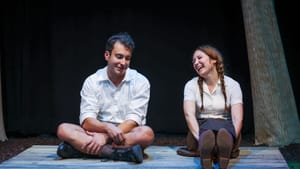Stay in the Loop
BSR publishes on a weekly schedule, with an email newsletter every Wednesday and Thursday morning. There’s no paywall, and subscribing is always free.
Tomorrow belongs to them
Theatre Exile presents Bess Wohl’s Camp Siegfried

Once upon a time, I dated a Nazi. He wasn’t a prewar one, like the teenage boy in Theatre Exile’s production of Bess Wohl’s Camp Siegfried. However, much like that boy, he was born of German stock and made in America.
He/Him (here, Adam Howard) is an undersized 1938 misfit trying to impress his more physically impressive father and brothers. My Nazi was a 6’5” Teutonic college misfit trying to cobble together the pieces of a shattered home and gather strength from the ruins of his family history.
But as Wohl makes clear, no matter where or when you live, if you’re broken inside, fascism—with its scapegoats and outcast affinities strong enough to patch over any psychic fissure—offers an easy fix.
It used to be downright upright to support the Nazis as a member of the German American Bund. American heroes Henry Ford and Charles Lindbergh did it. A Madison Square Garden rally filled with 20,000 Americans did it. And across the country, from California to Connecticut, Nazi summer camps for blossoming young volk flourished.
Seductive dogma
The real-life Camp Siegfried in Yaphank, New York, on Long Island was but one of these bucolic retreats. It was a place where parents frolicked on lakes and in biergartens and children built their strength by literally building the camp’s facilities. Those children were also expected to produce the next generation of Aryan Übermenschen and mädchen right there on the camp grounds.
That’s where we meet Jenna Kuerzi’s She/Her trying a beer for what looks like the first time. She’s 16, a giggly introvert, and reluctant Aryan, and He/Him swaggers over to explain the camp’s ins and outs with all the forced confidence of a sophomore approaching a freshman. An Oompah band belches its raucous beat somewhere far in the background. They wear khaki scout-style uniforms. She cheerfully announces she’s spending the summer on Hitler Street.
The play, a two-hander, progresses with their relationship, a dance of will-they-won’t-they banter punctuated by log splitting, platform building, brick hauling, and descriptions of midnight hikes and memorized recitations. It’s a pattern familiar to any devotee of true-crime cult documentaries. They are seduced by dogma and seducing each other, playing with domination and submission.
Missing momentum
Under Deborah Block’s direction, the pair appears charming, the banality of evil in a meet-cute, until their flirtations take a dark turn, one hinted at by Her’s admiration for the Valkyrie Brunhilde and His's repeated complaints about being the family “runt.” It’s a shocking scene that ought to indicate the start of a slow, simmering build. Instead, the production moves forward more like a collection of vignettes than a cohesive arc, never quite finding its momentum.
Kuerzi and Howard show flashes of what could be as the power dynamic between the pair shifts. They’re like puppies, alternately rolling and playing and fighting. The tension between them occasionally succeeds, but it recedes far too often leaving them mostly benign until they’re suddenly not.
The issue originates with Wohl, who perhaps narrowed the scope of her subject too far. Sure, the kids make a great metaphor, but it’s both fairly obvious and more insidious than what we get onstage. At one point, the play had six characters, which hints that the piece might have benefitted from other perspectives. After all, kids don’t have much choice about how they spend their summers, but the adults around them do.
Always a new patch
Still, there is no shortage of contemporary parallels to consider beneath the surface of Wohl’s historical reconstruction. For instance, my Nazi? He gave up the SS fetish and made his peace with Jewish people. The last I heard, he was a devoted Trump supporter, shouting slogans at rallies and posting on social media about the days when America was great. It seems whenever those old patches wear out, there’s always a new one to try on.
What, When, Where
Camp Siegfried. By Bess Wohl, directed by Deborah Block. $35-$40. Through November 12, 2023, at Theatre Exile, 1340 S 13th Street, Philadelphia. theatreexile.org.
Accessibility
Theatre Exile is a wheelchair-accessible venue with gender-neutral restrooms.
Masks are not required.
Sign up for our newsletter
All of the week's new articles, all in one place. Sign up for the free weekly BSR newsletters, and don't miss a conversation.

 Wendy Rosenfield
Wendy Rosenfield